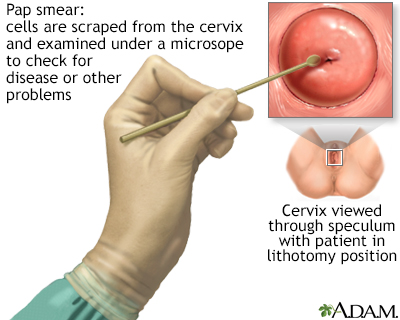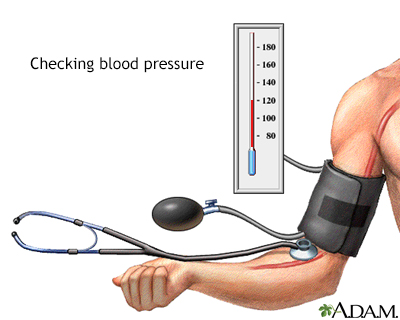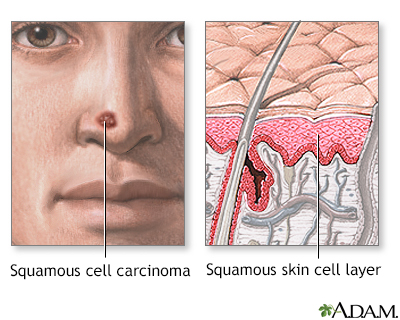
Health maintenance visit - women - over age 65; Physical exam - women - over age 65; Yearly exam - women - over age 65; Checkup - women - over age 65; Women's health - over age 65; Preventive care exam - women - over age 65
You should visit your health care provider from time to time, even if you are healthy. The purpose of these visits is to:








Even if you feel fine, you should still see your provider for regular checkups. These visits can help you avoid problems in the future. For example, the only way to find out if you have high blood pressure is to have it checked regularly. High blood sugar and high cholesterol levels also may not have any symptoms in the early stages. A simple blood test can check for these conditions.
There are specific times when you should see your provider or receive specific health screenings. The US Preventive Services Task Force publishes a list of recommended screenings. Below are screening guidelines for women age 65 and older.
BLOOD PRESSURE SCREENING
Have your blood pressure checked at least once every year. Watch for blood pressure screenings in your area. Ask your provider if you can stop in to have your blood pressure checked. You can also check your blood pressure using the automated machines at local grocery stores and pharmacies.
Ask your provider if you need your blood pressure checked more often if:
If the top number is 130 mm Hg or greater, but lower than 140 mm Hg or the bottom number is 80 mm Hg or greater but lower than 90 mm Hg, this is considered to be stage 1 hypertension. Readings above these are considered to be stage 2 hypertension. Schedule an appointment with your provider to learn how you can reduce your blood pressure. Record your blood pressure numbers and bring this information to share with your provider.
BREAST CANCER SCREENING
Experts do not agree about the benefits of breast self-exams in finding breast cancer or saving lives. Talk to your provider about what is best for you.
Mammography is performed to screen women to detect early breast cancer when it is more likely to be cured. The recommendations of different expert organizations can differ.
Mammograms work best at finding breast cancer in women ages 40 to 74. It is not clear how well mammograms work at finding cancer in women age 75 and older. Talk to your provider about what is best for you.
CERVICAL CANCER SCREENING
After age 65, most women who have not been diagnosed with cervical cancer or precancer can stop having screening tests, as long as:
CHOLESTEROL SCREENING
If your cholesterol level is normal, have it rechecked at least every 5 years.
You should have repeat testing sooner if:
COLORECTAL CANCER SCREENING
Until age 75, you should have screening for colorectal cancer on a regular basis. Several tests are available for colorectal cancer screening:
You may need a colonoscopy more often if you have risk factors for colon cancer, including:
DENTAL EXAM
PREDIABETES AND TYPE 2 DIABETES SCREENING
You should be screened for prediabetes and type 2 diabetes every 3 years up to age 70 if you are overweight or have obesity.
EYE EXAM
HEARING TEST
IMMUNIZATIONS
Commonly needed vaccines include:
INFECTIOUS DISEASE SCREENING
Screening for hepatitis C:
Screening for human immunodeficiency virus (HIV):
Depending on your lifestyle and medical history, you may need to be screened for infections such as syphilis, chlamydia, and other infections.
LUNG CANCER SCREENING
You should have an annual screening for lung cancer with low-dose computed tomography (LDCT) if:
OSTEOPOROSIS SCREENING
PHYSICAL EXAMS
All adults should visit their provider from time to time, even if they are healthy. The purpose of these visits is to:
In addition:
During the exam, your provider will ask questions about:
SKIN EXAM
Your provider may check your skin for signs of skin cancer, especially if you're at high risk. You may be at risk if you:
Professional organizations do not recommend for or against performing a skin self-exam.
American Academy of Ophthalmology website. Clinical statement: comprehensive adult medical eye examination PPP 2020. www.aao.org/education/preferred-practice-pattern/comprehensive-adult-medical-eye-evaluation-ppp. Updated November 2020. Accessed May 21, 2024.
American Cancer Society website. Breast cancer early detection and diagnosis: American Cancer Society recommendations for the early detection of breast cancer. www.cancer.org/cancer/breast-cancer/screening-tests-and-early-detection/american-cancer-society-recommendations-for-the-early-detection-of-breast-cancer.html. Updated December 19, 2023. Accessed May 21, 2024.
American College of Obstetricians and Gynecologists (ACOG) website. FAQ178: Mammography and other screening tests for breast problems. www.acog.org/patient-resources/faqs/gynecologic-problems/mammography-and-other-screening-tests-for-breast-problems. Updated July 2022. Accessed May 21, 2024.
American College of Obstetricians and Gynecologists. FAQ163: Cervical cancer. www.acog.org/patient-resources/faqs/gynecologic-problems/cervical-cancer. Updated October 2023. Accessed May 21, 2024.
American Dental Association website. Your top 9 questions about going to the dentist -- answered! www.mouthhealthy.org/en/dental-care-concerns/questions-about-going-to-the-dentist. Accessed May 21, 2024.
American Diabetes Association Professional Practice Committee. 2. Diagnosis and Classification of Diabetes: Standards of Care in Diabetes-2024. Diabetes Care. 2024;47(Suppl 1):S20-S42. PMID: 38078589; PMCID: PMC10725812. pubmed.ncbi.nlm.nih.gov/38078589/.
Barton MB, Wolff TA. The preventive health visit. In: Goldman L, Schafer AI, eds. Goldman-Cecil Medicine. 27th ed. Philadelphia, PA: Elsevier; 2024:chap 12.
Brown HL, Warner JJ, Gianos E, et al; American Heart Association and the American College of Obstetricians and Gynecologists. Promoting risk identification and reduction of cardiovascular disease in women through collaboration with obstetricians and gynecologists: a presidential advisory from the American Heart Association and the American College of Obstetricians and Gynecologists. Circulation. 2018;137(24):e843-e852. PMID: 29748185 pubmed.ncbi.nlm.nih.gov/29748185/.
Centers for Disease Control and Prevention website. Recommended Vaccinations for Adults. Recommended Immunizations for adults aged 19 years and older, United States, 2024. www.cdc.gov/vaccines/imz-schedules/adult-easyread.html. Updated August 14, 2024. Accessed September 26, 2024.
Grundy SM, Stone NJ, Bailey AL, et al. 2018 AHA/ACC/AACVPR/AAPA/ABC/ACPM/ADA/AGS/APhA/ASPC/NLA/PCNA Guideline on the management of blood cholesterol: a report of the American College of Cardiology/American Heart Association Task Force on Clinical Practice Guidelines [published correction appears in J Am Coll Cardiol. 2019;73(24):3237-3241]. J Am Coll Cardiol. 2019;73(24):e285-e350. PMID: 30423393 pubmed.ncbi.nlm.nih.gov/30423393/.
Meschia JF, Bushnell C, Boden-Albala B; American Heart Association Stroke Council; et al. Guidelines for the primary prevention of stroke: a statement for healthcare professionals from the American Heart Association/American Stroke Association. Stroke. 2014;45(12):3754-3832. PMID: 25355838 pubmed.ncbi.nlm.nih.gov/25355838/.
Mora S, Libby P, Ridker PM. Primary prevention of cardiovascular disease. In: Libby P, Bonow RO, Mann DL, Tomaselli GF, Bhatt DL, Solomon SD, eds. Braunwald's Heart Disease: A Textbook of Cardiovascular Medicine. 12th ed. Philadelphia, PA: Elsevier; 2022:chap 25.
National Cancer Institute website. Breast cancer screening (PDQ) - health professional version. www.cancer.gov/types/breast/hp/breast-screening-pdq. Updated March 28, 2024. Accessed May 21, 2024.
Studenski S, Van Swearingen J. Falls. In: Fillit HM, Rockwood K, Young J, eds. Brocklehurst's Textbook of Geriatric Medicine and Gerontology. 8th ed. Philadelphia, PA: Elsevier; 2017:chap 103.
US Preventive Services Task Force website. Falls prevention in community-dwelling older adults: interventions. www.uspreventiveservicestaskforce.org/uspstf/recommendation/falls-prevention-community-dwelling-older-adults-interventions. Published June 4, 2024. Accessed July 3, 2024.
US Preventive Services Task Force website. Final recommendation statement. Breast cancer: medication use to reduce risk. www.uspreventiveservicestaskforce.org/uspstf/recommendation/breast-cancer-medications-for-risk-reduction. Updated September 3, 2019. Accessed May 21, 2024.
US Preventive Services Task Force website. Final recommendation statement. Cervical cancer: screening. www.uspreventiveservicestaskforce.org/uspstf/recommendation/cervical-cancer-screening. Updated August 21, 2018. Accessed May 21, 2024.
US Preventive Services Task Force website. Final recommendation statement. Colorectal cancer: screening. www.uspreventiveservicestaskforce.org/uspstf/recommendation/colorectal-cancer-screening. Updated May 18, 2021. Accessed May 21, 2024.
US Preventive Services Task Force website. Final recommendation statement. Hepatitis C virus infection in adolescents and adults: screening. www.uspreventiveservicestaskforce.org/uspstf/recommendation/hepatitis-c-screening. Published March 2, 2020. Accessed May 21, 2024.
US Preventive Services Task Force website. Final recommendation statement. Human immunodeficiency virus (HIV) infection: screening. www.uspreventiveservicestaskforce.org/uspstf/recommendation/human-immunodeficiency-virus-hiv-infection-screening. Published June 11, 2019. Accessed May 21, 2024.
US Preventive Services Task Force website. Hypertension in adults: screening. www.uspreventiveservicestaskforce.org/uspstf/recommendation/hypertension-in-adults-screening. Published April 27, 2021. Accessed May 21, 2024.
US Preventive Services Task Force website. Final recommendation statement: Lung cancer: screening. www.uspreventiveservicestaskforce.org/uspstf/recommendation/lung-cancer-screening. Updated March 9, 2021. Accessed May 21, 2024.
US Preventive Services Task Force website. Final recommendation statement. Osteoporosis to prevent fractures: screening. www.uspreventiveservicestaskforce.org/uspstf/recommendation/osteoporosis-screening. Updated June 26, 2018. May 21, 2024.
US Preventive Services Task Force website. Final recommendation statement. Prediabetes and type 2 diabetes: screening. www.uspreventiveservicestaskforce.org/uspstf/recommendation/screening-for-prediabetes-and-type-2-diabetes. Updated August 24, 2021. Accessed May 21, 2024.
US Preventive Services Task Force website. Final recommendation statement. Skin cancer: screening. www.uspreventiveservicestaskforce.org/uspstf/recommendation/skin-cancer-screening. Updated April 18, 2023. Accessed May 21, 2024.
US Preventive Services Task Force; Nicholson WK, Silverstein M, Wong JB, Barry MJ, Chelmow D, Coker TR, Davis EM, Jaén CR, Krousel-Wood M, Lee S, Li L, Mangione CM, Rao G, Ruiz JM, Stevermer JJ, Tsevat J, Underwood SM, Wiehe S. Screening for Breast Cancer: US Preventive Services Task Force Recommendation Statement. JAMA. 2024 Apr 30. Epub ahead of print. PMID: 38687503. pubmed.ncbi.nlm.nih.gov/38687503/.
Whelton PK, Carey RM, Mancia G, Kreutz R, Bundy JD, Williams B. Harmonization of the American College of Cardiology/American Heart Association and European Society of Cardiology/European Society of Hypertension Blood Pressure/Hypertension Guidelines: comparisons, reflections, and recommendations. Circulation. 2022;146:868-877. DOI: 10.1161/CIRCULATIONAHA.121.054602. PMID 35950927. pubmed.ncbi.nlm.nih.gov/35950927/.
BACK TO TOPReview Date: 8/1/2023
Reviewed By: David C. Dugdale, III, MD, Professor of Medicine, Division of General Medicine, Department of Medicine, University of Washington School of Medicine. Also reviewed by David Zieve, MD, MHA, Medical Director, Brenda Conaway, Editorial Director, and the A.D.A.M. Editorial team. Internal review and update on 08/01/23. Editorial update: 09/26/2024.

|
A.D.A.M., Inc. is accredited by URAC, also known as the American Accreditation HealthCare Commission (www.urac.org). URAC's accreditation program is an independent audit to verify that A.D.A.M. follows rigorous standards of quality and accountability. A.D.A.M. is among the first to achieve this important distinction for online health information and services. Learn more about A.D.A.M.'s editorial policy, editorial process and privacy policy. A.D.A.M. is also a founding member of Hi-Ethics and subscribes to the principles of the Health on the Net Foundation (www.hon.ch). |
The information provided herein should not be used during any medical emergency or for the diagnosis or treatment of any medical condition. A licensed medical professional should be consulted for diagnosis and treatment of any and all medical conditions. Call 911 for all medical emergencies. Links to other sites are provided for information only -- they do not constitute endorsements of those other sites. © 1997- A.D.A.M., Inc. Any duplication or distribution of the information contained herein is strictly prohibited.